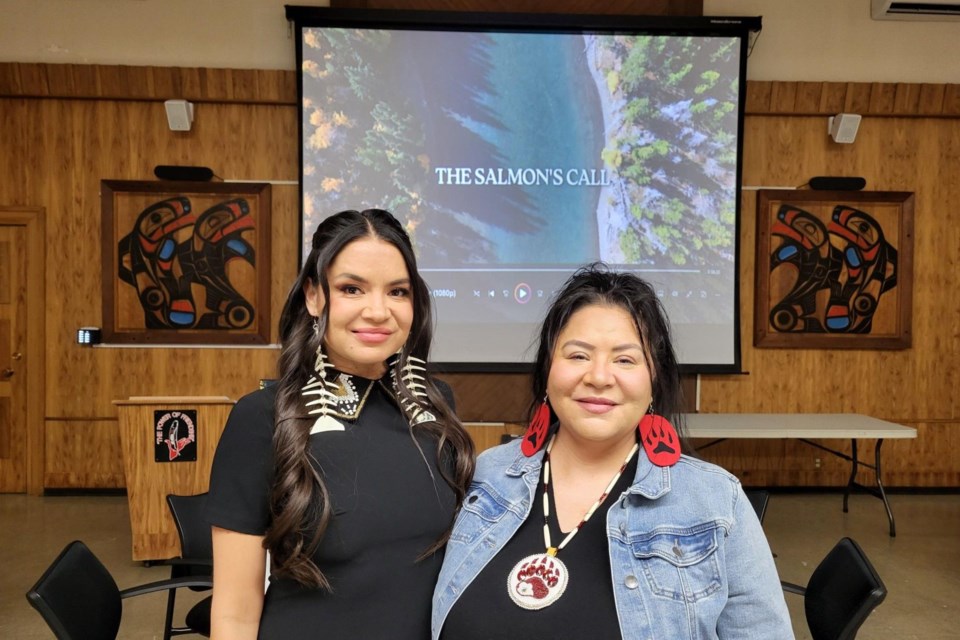From the Tl'azt'en Nation documentary film maker Joy Haskell presented The Salmon’s Call at the Native Friendship Centre recently where the community gathered to see the movie that explored the intricate spiritual and cultural relationship between wild salmon and Indigenous people.
Joy Haskell is an Indigenous filmmaker based in Vancouver. She was recently elected to the Canadian Media Producers Association BC Branch Council and sits on the Indigenous Working Group within the council.
For Haskell it was a full circle moment to do a screening of her documentary at the local Friendship Centre as her mother Winnie Marcellais helped build the Centre from the ground up.
As Haskell walked through those hallowed halls, she stopped to visit the portrait of her mother that holds a place of honour at the Native Friendship Centre.
“This is my first time in this building because when she started all of this it was literally started in a room.”
From discussions by a small group of leaders came the flourishing centre that now employs more than 200 people while serving thousands with supportive programming, career development and training, emergency responses, day care and youth programs, family law legal advocacy, shelter programs, cultural advisors, elder activities and more.
“My mom always supported my goals and encouraged me,” Haskell said.
The Salmon’s Call doc came about when Haskell had been asked to do a series of short films on the Discovery Bay fish farms. It was something she really had to research, she said.
“I always knew fish farms were bad but I didn’t realize how bad they were,” Haskel said.
“Fish farms are foreign to our waters.”
Research shows the operation of open net-pen fish farms in B.C.’s coastal waters pose a direct threat to wild Pacific salmon health. Fish farms expose wild Pacific salmon to viruses and sea lice that spread quickly, leading to disease and depleted stocks, impacting the ecosystem and innumerable coastal and interior communities that rely on the salmon.
“So when I started thinking about the salmon’s travel routes I thought about my home territory,” Haskell said.
“So I asked and they did get diseased and deformed fish in their waters, too. So that really impacted me and so I told my producer that I had to do a full-length documentary about salmon because I just couldn’t sit with it. It was so heavy on me. So I spent a few years developing the idea and then we just kept putting it out there and then we got the green light from Knowledge Network, which I am thankful for.”
The documentary will make its debut on the Knowledge Network on June 17.
Haskell said she has such an appreciation for Shauna Baker, Dakelh Dené from the Stellat’en First Nation, who is from the same territory and is an actor, model, podcast host.
“Shauna has the same passion for fish as I do,” Haskell said.
“I am such a big fan of Joy that when she invited me to be part of the project I said yes and it wasn’t until about two days before I was to do my interview I got nervous," Baker said.
"I have never felt imposter syndrome — ever — in the sense of being Indigenous. I was rez raised and now I live an urban Indian life. So I had never felt imposter syndrome until I thought about talking about salmon and I’m talking about where I grew up and I started to think ‘what if I say the wrong things’ or give incorrect information and then I talked to my grandma and I talked to my mom and they were like ‘you are going to be OK, you know a lot, you’re OK.’ I guess I just want to make my elders proud of me and I want to be as correct and factual as possible.”
It was a surprise for Baker when she got emotional during the filming of the documentary.
“But it happened because it’s part of us, the waters and salmon,” Baker said.
“It is such a beautiful film, I am so thankful to be included.”
For Haskell, it was really important to have women represented in the film.
“I feel fishing is often referred to as a man’s sport but in the Indigenous community it’s not that way,” Haskell said.
“It was my Aunties that taught me to fish and got me up at 5 o’clock in the morning and we’d go and set the net and afterwards repair the net and so there’s a whole thing to it and so it was really important to me to have an Auntie segment in the documentary and that included younger Aunties and older,” Haskell said.
It was important to show how the older generation shares their knowledge with the younger Indigenous people, she added.
“Why we get so emotional is this is how we are taught,” Haskell said.
“When you get to fish together you feel you are being called home and you all get together and that’s bonding time with our Aunties and cousins. It’s just about sharing and spending time together and that’s really important. To think about that time taken away — it’s sacred to us.”
Salmon fishing and its preparation is a very sacred part of the Indigenous culture, Haskell added.
“Salmon don’t have a voice, they can’t tell us that they need our help so we’re their voice,” Haskell said.
“We need to get rid of the fish farms and protect the pristine waters of our oceans and streams.”
The film can be seen on the Knowledge Network on June 17 at https://www.knowledge.ca/program/salmons-call and will air on Tuesday, June 24 at 9 p.m.



